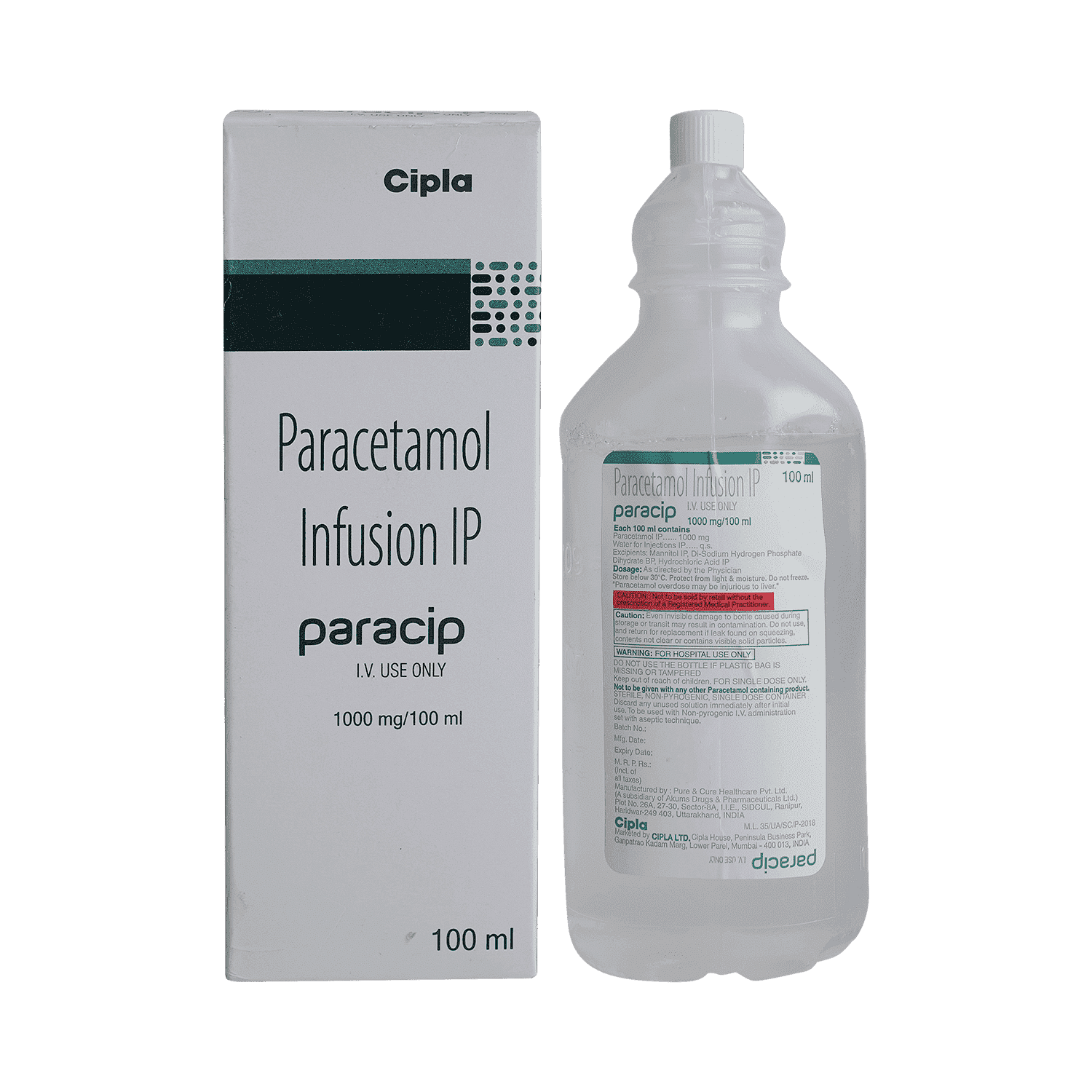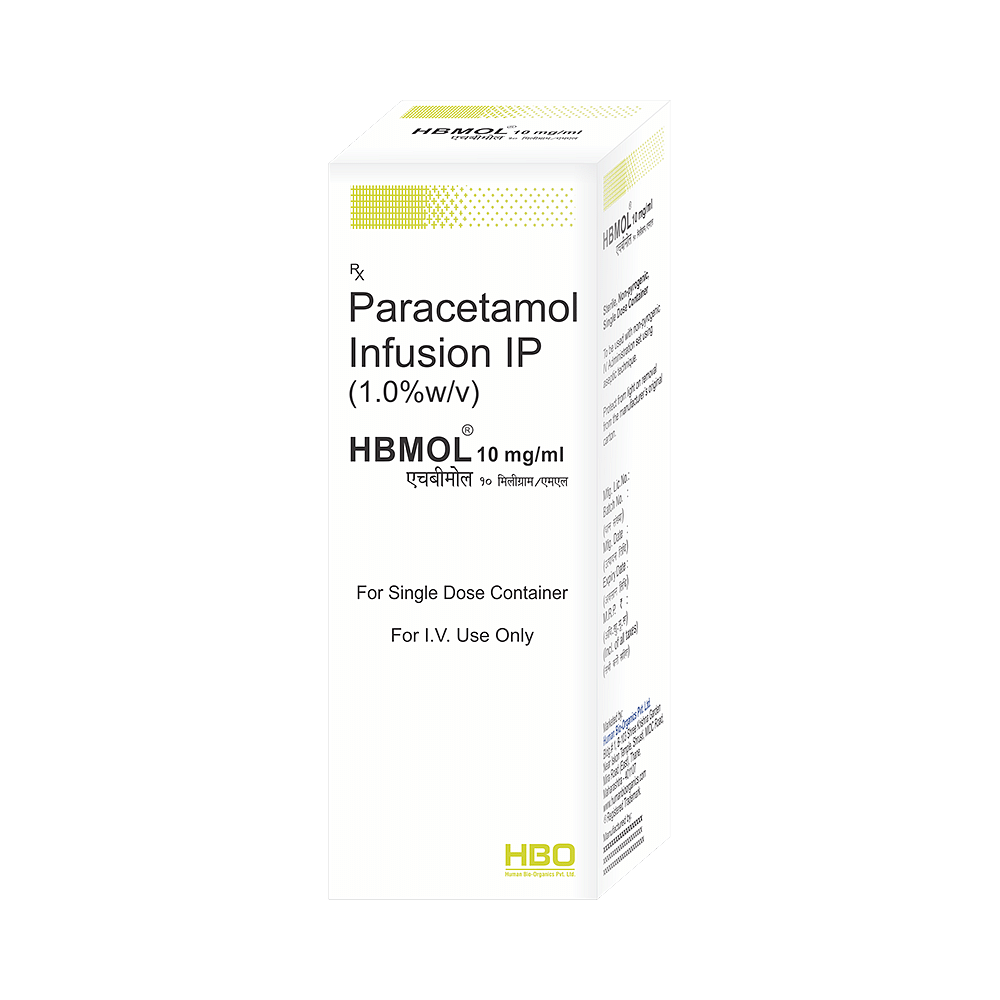
Parafuse Infusion
Manufacturer
Samarth Life Sciences Pvt Ltd
Salt Composition
Paracetamol (1000mg)
Key Information
Short Description
Parafuse Infusion helps in relieving moderate pain and reducing fever for the short-term in cases following surgery or in cases where oral administration is not possible.
Dosage Form
Infusion
Introduction
Parafuse Infusion is administered by a doctor or a nurse and should not be self-administered. Depending on the severity of your underlying illness, your doctor will decide the precise dose and schedule as per which this injection is to be given. It starts working within one hour. Inform your doctor if you are also taking other medications containing paracetamol to avoid an overdose. You should let your doctor know if your pain or fever does not subside. Vomiting, difficulty sleeping, and constipation may be seen as side effects in some patients. Consult your doctor if these side effects do not resolve with time and persist for a longer duration of time. Inform your doctor immediately if any rash or allergic reaction is observed while taking this medicine. Pregnant and nursing women should use it under medical supervision only. It should be used with caution in patients with liver and kidney disease or alcohol abuse. It is not recommended in patients with severe or active liver disease.
Directions for Use
Your doctor or nurse will give you this medicine. Kindly do not self-administer.
Safety Information
Side Effects
No common side effects listed.
Alcohol Warning
It is unsafe to consume alcohol with Parafuse Infusion.
Breastfeeding Warning
Parafuse Infusion is safe to use during breastfeeding. Human studies suggest that the drug does not pass into the breastmilk in a significant amount and is not harmful to the baby.
Pregnancy Warning
Parafuse Infusion is safe to use during pregnancy. Most studies have shown low or no risk to the developing baby.
Interacting Medicines
Nimesulide Oxyphenbutazone Metamizole
How it works
Parafuse Infusion is an analgesic (pain reliever) and anti-pyretic (fever reducer). It works by blocking the release of certain chemical messengers that cause pain and fever.
Quick Tips
Inform your doctor if you are also taking other medications containing paracetamol. Inform your doctor if you suffer from liver disease, severe kidney disease, or alcohol abuse. Inform your doctor if you experience symptoms such as feeling or being sick, weight loss, pale skin (pallor), or abdominal pain within the first 24 hours as it indicates an overdose. Your doctor may regularly monitor your kidney function, liver function, and levels of blood components if you are taking this medicine for long-term treatment.
Related Medicines

Paramay IV 1000mg Infusion

Dolo Infusion

Paracip Infusion

Perocimol 1000mg Infusion

Profuse 1000mg Infusion

Phencita 1000mg Infusion

Picmol IV 1000mg Infusion

Afymol Infusion

Taap 98 Infusion

Hbmol 10mg/ml Infusion
Frequently asked questions
How is Parafuse Infusion administered?
Parafuse Infusion must be administered only under the supervision of a trained healthcare professional or doctor. Self-administration is not recommended. The dosage will vary depending on your specific medical condition and will be determined by your doctor. Carefully follow your doctor's instructions to maximize the benefits of Parafuse Infusion.
What if I vomit after taking Parafuse Infusion?
If you experience vomiting within 30 minutes of consuming a dose of Parafuse Infusion tablets or syrup, retake the same dosage. If you vomit more than 30 minutes after a dose, do not take another one until your next scheduled dose.
What are the serious side effects of taking an excess of Parafuse Infusion?
Overdose of Parafuse Infusion can cause severe and potentially life-threatening liver injury. Exceeding the prescribed dosage may also lead to kidney injury, a decrease in platelet count, and even coma. Initial symptoms of an overdose include nausea, vomiting, and general fatigue. Seek immediate medical attention or call emergency services if you suspect an overdose.
When will I feel better after taking Parafuse Infusion?
You are likely to start feeling better within about half an hour of taking Parafuse Infusion.
Is Parafuse Infusion an antibiotic?
No, Parafuse Infusion is not an antibiotic. It functions as a painkiller and fever reducer medication.
Is Parafuse Infusion safe for children?
Parafuse Infusion is considered safe for children only when used under the direction of their doctor.
Can I take Parafuse Infusion and ibuprofen together?
Ibuprofen and Parafuse Infusion are both safe medications to combine, but it's important to avoid using them simultaneously. Please consult your doctor if you have any questions or concerns about possible interactions.
Does Parafuse Infusion make babies sleepy?
No, Parafuse Infusion does not cause sleepiness in infants. It is a pain reliever and fever reducer that's also commonly used for controlling high fevers.


